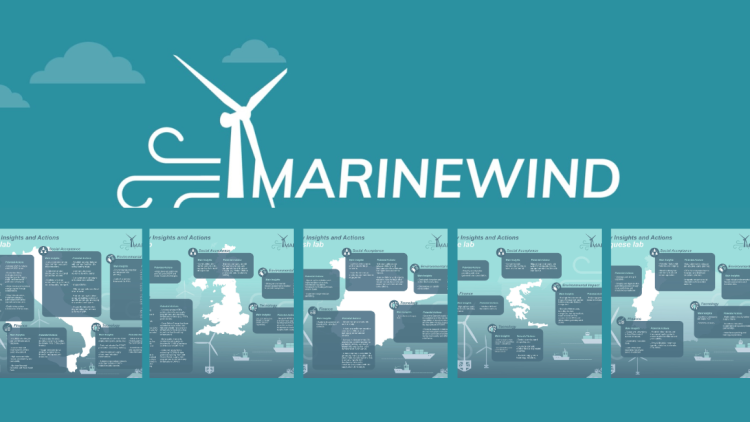PRESS RELEASE
30 October 2025
The European project MARINEWIND – Market Uptake Measures of Floating Offshore Wind Technology Systems, funded by the European Union under the Horizon Europe programme and by UKRI, concluded its three-year journey with a Final Conference held on 1 October 2025 at the Floating Wind Innovation Centre (FLOWIC) in Aberdeen, Scotland, hosted by Offshore Renewable Energy Catapult.
Under the theme “Beyond MARINEWIND: Real-world insights to unlock the potential of Floating Offshore Wind”, the event brought together port authorities, researchers, civil society and industry representatives from across Europe to discuss the project’s results and future pathways for floating offshore wind (FOW) deployment.
The day opened with a keynote speech by Jack Taylor, Head of Offshore Wind Policy at the Scottish Government, titled “Floating Wind in the UK Energy Transition”. Taylor highlighted the crucial role of floating wind in achieving net zero while underlining the challenges still facing the sector, from permitting delays and grid constraints to investment uncertainty. He also called attention to the need for regional leadership in developing port infrastructure and supply chains, as well as for policy and planning alignment and inclusive community engagement to ensure that the economic and social benefits of the energy transition are widely shared.
The conference also marked the presentation of MARINEWIND’s final policy recommendations, which propose concrete actions to accelerate floating offshore wind deployment across Europe. These include reforms to Contract for Difference (CfD) schemes, coordinated port and grid planning, and enhanced community engagement to secure long-term public support. The project’s analytical tools and insights are already informing discussions at national and EU levels on how to create the conditions for sustainable market growth.
Building on the keynote, the conference continued with two thematic panels that examined the challenges and opportunities shaping FOW deployment.
Panel 1 – Tackling Deployment Challenges: Grid, Ports, Supply Chain, Decommissioning and Technology Validation
Moderated by Inès Tunga (Energy Systems Catapult), this session featured Marlene Mitchell (Port of Aberdeen), Hugh Riddell (Offshore Renewable Energy Catapult) and Ana Teresa Lima (Technical University of Denmark). The debate focused on supply chain readiness, port infrastructure needs and the validation of innovative technologies. Participants emphasised the importance of preparing ports and grids for large-scale deployment, strengthening investor confidence, embedding circularity from design to decommissioning and fostering community understanding of FOW benefits.
Panel 2 – Integrated and Multi-Stakeholder Planning for Sustainable Floating Offshore Wind Deployment
Introduced by Davide Airoldi (Research on the Energy System – RSE S.p.A.) and Luca Greco (National Research Council – CNR) and moderated by Flaminia Rocca (Agency for the Promotion of the European Research – APRE ), this panel brought together Patrice Burnside (E-FWD and Energy Voice), Diana Byonge (Offshore Renewable Energy Catapult) and Elena Ghezzi (Legacoop Agroalimentare). Discussions revolved around maritime spatial planning, co-existence with traditional sectors such as fisheries, CfDs as pivotal revenue support mechanism, and the creation of local value chains through education, training and financial innovation. Speakers stressed that risk management, community engagement and targeted investment in research and infrastructure are critical to make FOW projects bankable and socially accepted.
Key messages emerging from the conference included:
• accelerating grid and port infrastructure readiness
• fostering investor confidence and clear regulatory frameworks
• supporting education, reskilling and community benefit schemes
• promoting continuous dialogue with local stakeholders
• strengthening collaboration between governments, industry and citizens to enable an inclusive energy transition
The event concluded with a visit to the FLOWIC facilities, offering participants an on-site look at the innovations driving the UK’s leadership in floating offshore wind development.
“MARINEWIND has shown how collaboration across Europe can turn ambition into action,” said Riccardo Coletta, Senior Project Coordinator at APRE. “Our research shows that Europe has the technical capacity to lead in floating offshore wind, but success now depends on political alignment and smart investment in ports, grids and people. If we get these elements right, floating wind can become one of Europe’s biggest clean energy success stories.”
The outcomes and final recommendations of the project are available on the website:: www.marinewindproject.eu
CONTACTS
Name: Riccardo Coletta, Paola Zerilli
Email: coletta@apre.it , paola.zerilli@york.ac.uk
Communication: janete.correia@wavec.org



